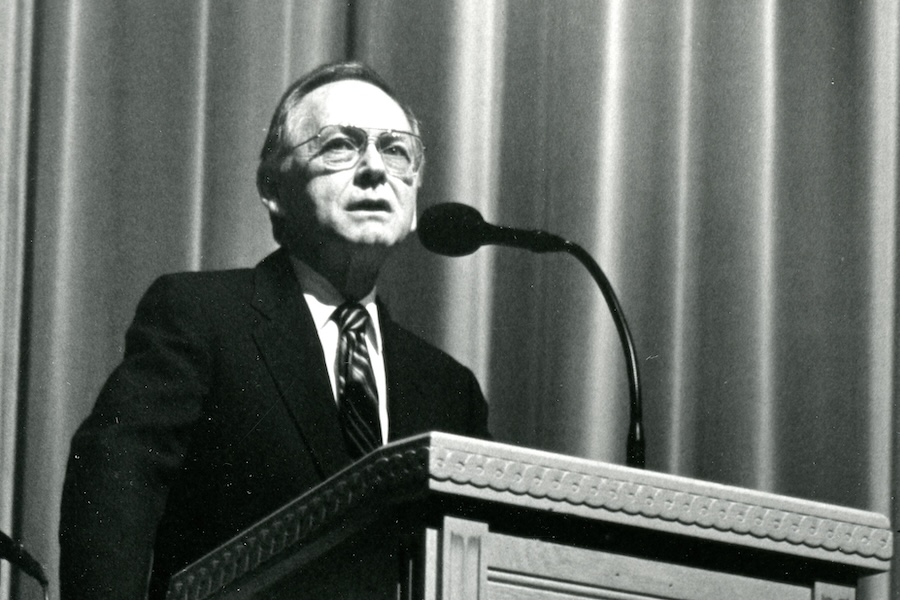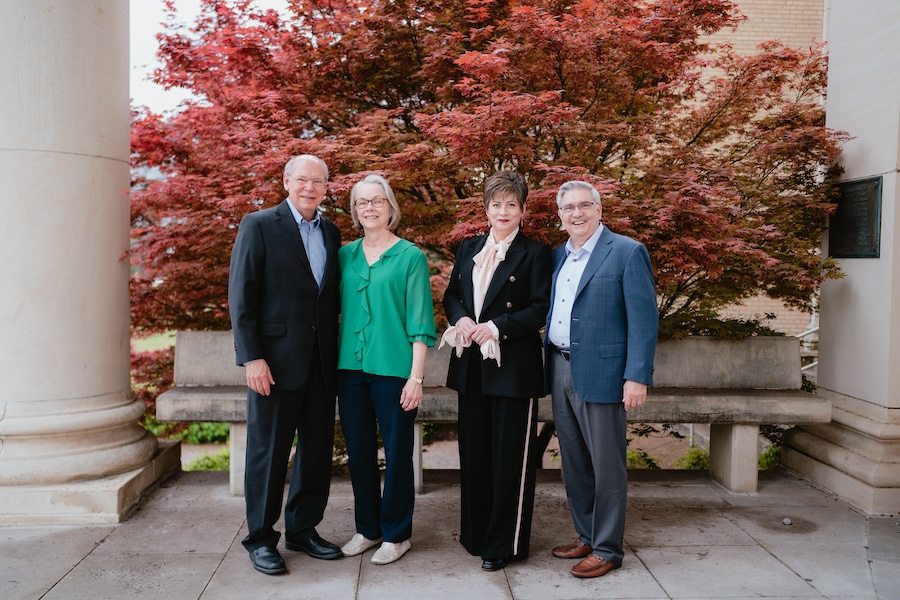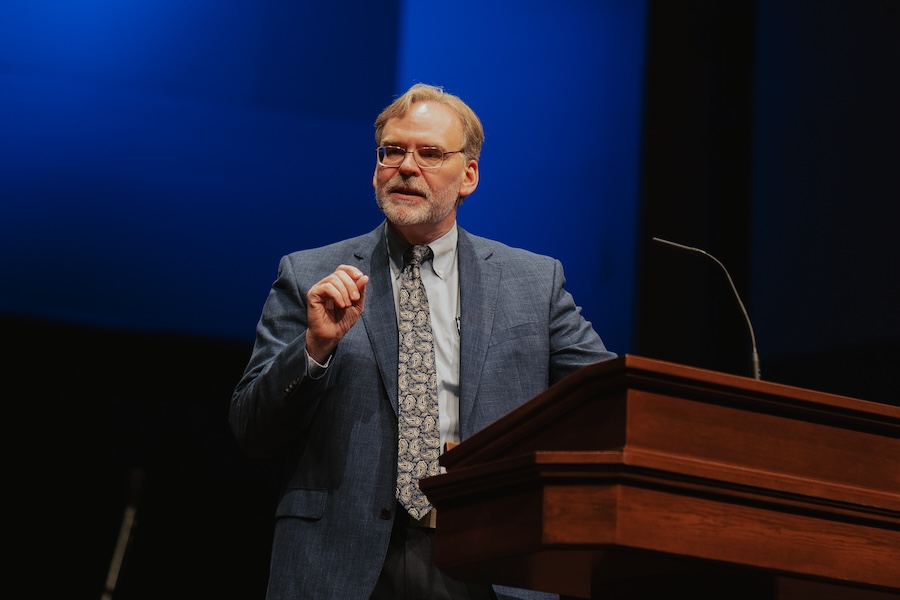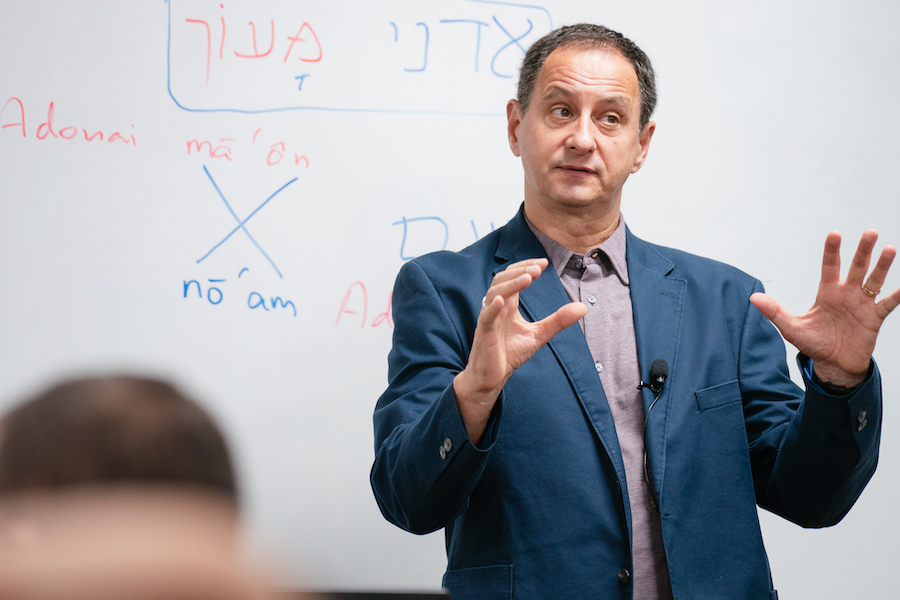Jennings answered unusual call to faith, prepares students for questions about Christianity
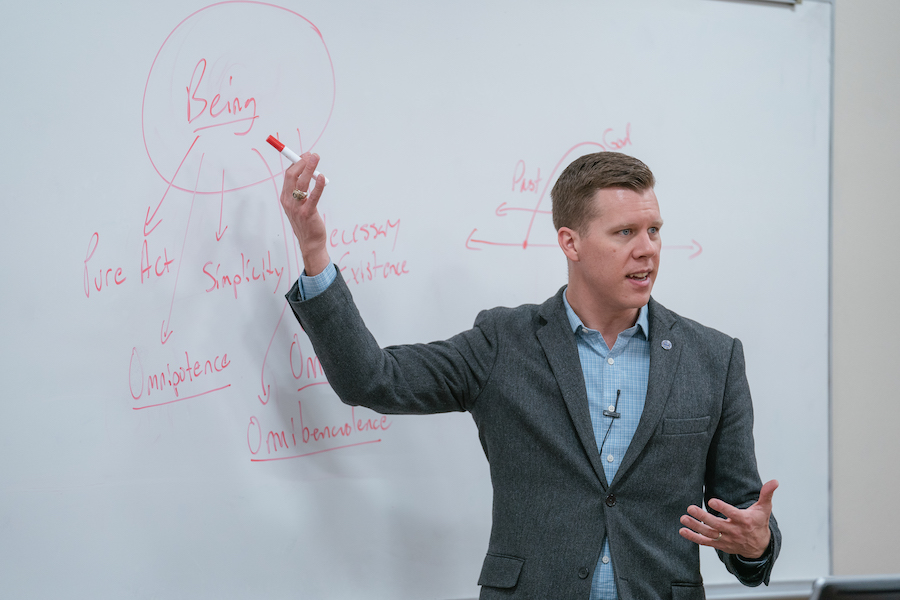
Andrew Jennings said he had a “normal Southern Baptist childhood” while growing up in East Texas. His call to faith was a bit unusual, though.
“It was really through sibling rivalry that I wound up being open to hearing the Gospel message,” he said with a laugh.
Jennings, assistant professor of philosophy of religion and apologetics at Texas Baptist College, said his family regularly attended Emmanuel Baptist Church in White Oak, Texas. His mother was sick one Sunday evening and the family was going to stay home from church. Jennings’s older brother, who was the first sibling to become a Christian, really wanted to go because the church was holding the Lord’s Supper that evening. Their dad said he would take the older boy to church and Jennings and his younger brother could stay home with their mom.
“And, of course, I asked why don’t I get to go,” Jennings said. His dad replied that even if Jennings went, he wouldn’t be able to take the Lord’s Supper because “you’re not a believer.”
“And I just wouldn’t have that,” Jennings added.
He “had a lot of conversations with my parents about that” over the next week and accepted Christ at the age of 7.
When he reached high school, Jennings became interested in apologetics. One of the major questions he had was whether church was “one of those things where you go in, you worship, you hear a good talk about how to be a good person, … but there’s not really a whole lot of depth to it.”
Jennings explained that he was not criticizing his pastor or his church. “It was just my experience,” he said.
He also had a penchant for math and said his love for the subject grew as he went through high school. He decided to pursue a Doctor of Philosophy degree to teach high-level math at colleges and chose to major in math for his undergraduate studies at the University of Oklahoma (OU).
He began attending Trinity Baptist Church in Norman, Oklahoma, while at OU and described the church as “theologically robust. … I got introduced to a lot of, kind of the core concepts of Christianity beyond just the Gospel and good Christian living.”
Jennings taught small groups throughout his college career. When he started pursuing his Ph.D. in math at Texas A&M University, he began teaching in church and “really felt a call into the ministry.” He came to Southwestern Seminary to pursue a Master of Divinity degree, “still with the idea that I will get a Ph.D. and possibly teach at seminary,” he said.
Jennings noted that when he began his studies at Southwestern, “online education wasn’t really a thing, which is only 15 years ago. It’s crazy to say that.”
“I actually helped get the first online program that we did going,” he added. Jennings worked in classroom support and said he filmed the first courses that would become the online education component of Southwestern. “That was a lot of fun,” he said.
Jennings entered vocational church ministry after completing his M.Div., serving in churches in Arkansas and Texas for almost nine years before returning to Southwestern to finish his Ph.D.
Jennings actually started his Ph.D. at Southern Baptist Theological Seminary but said “when Dr. Ted Cabal moved from Southern to Southwestern, I followed him here.” Cabal was his main professor and mentor at Southern, he said, adding, “He was extremely formative in my studies and a good friend on top of being a great professor. I thought that I would benefit more from being under his supervision as a Ph.D. student.”
For his part, Cabal, professor of philosophy of religion at Southwestern, said he was “immediately struck by the brilliant mind of Andy Jennings [as a student]. In fact, I’ve never had a smarter student. I quickly came, however, to appreciate that Andy is a man of outstanding Christian character.”
“Today,” Cabal added, “I find great encouragement in leaning on his wisdom as a colleague. Dr. Jennings is a true kingdom treasure for which the SWBTS community should be deeply grateful.”
Jennings said his main goal in the classroom is to get students thinking. The philosophy of religion and the ethics courses at the seminary have a lot of good content, he said, “but one of the primary functions of those courses is to get them thinking deeply about questions that people in their congregations will be asking, questions that our culture is asking, and really beginning to work through the process of learning to reason about those questions.”
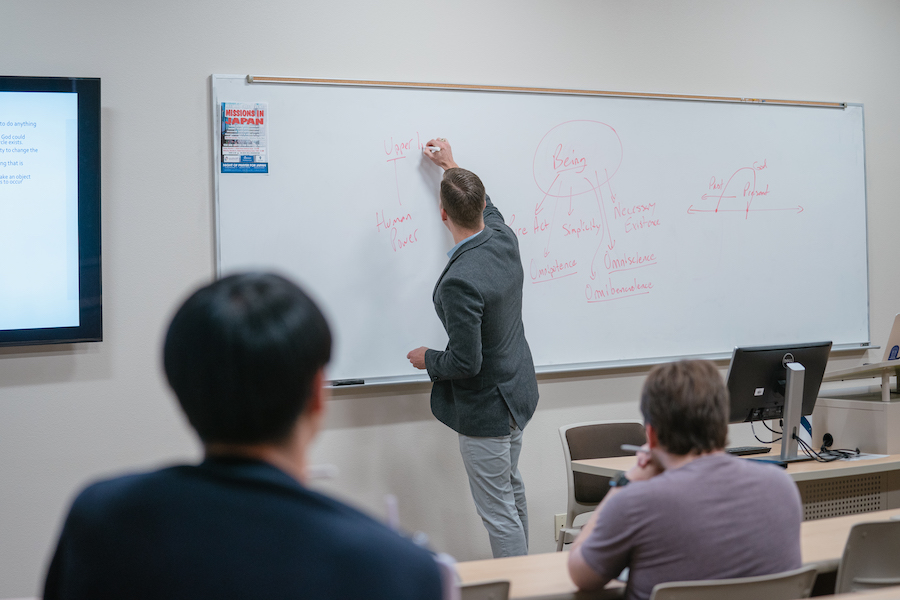
Two-time Southwestern alumnus Andrew Jennings now serves as the assistant professor of philosophy of religion and apologetics.
In a recent Christian Apologetics course, students watched YouTube videos of “critics of Christianity,” Jennings said, adding he then asked them how they would respond, given what they’d learned in class.
“And I have found that that’s a very useful exercise for students,” he said, adding that many students come to the seminary having never experienced philosophy or apologetics at any level. “And so we have the opportunity of helping them in those classes learn to think critically about the questions people are asking Christians of our faith. How do we defend it? … How do we show its coherence? And then how do we engage with people of other worldviews and show that the Christian worldview is really the one that makes the most sense, the one that answers the most questions in the best way, and the one that aligns most closely with the reality we experience?”
Dustin Owens, a Dallas-Fort Worth-area student pursuing an M.Div. at Southwestern, has taken four classes under Jennings.
“He’s personally responsible for really igniting my passion for philosophy,” Owens said.
He added that Jennings’s assignments are geared toward engaging students in philosophical conversation, “So you’re not just playing around with these ideas in your head; you’re actively putting them into practice with other students and with the teacher.” The exams, Owens said, are more focused on “comprehension of ideas and being able to engage with those ideas rather than memorization or just generally exploring a topic.”
Joel Zelaya, a student from Paraguay, took two classes under Jennings while working toward his M.Div. with a concentration in philosophy. Zelaya, who currently is pursuing a Ph.D. in philosophy at the seminary, said Jennings was “very, very good at making the class interact and not only just lecture.”
“Although the topics were very abstract, he always found a way to connect them to Christian practice if not to Christian implications, and that was always very helpful,” Zelaya added.
In his spare time, Jennings enjoys outdoor activities like fishing, camping, and hiking, as well as what he calls “probably my favorite hobby.”
“I love running,” he said. “And I love running races.”
Jennings said he runs 20 to 25 miles every week, and even ran in the December 2023 Dallas Half Marathon and the 2024 Cowtown Marathon in Fort Worth. He was pleased with his 1:49 finish in the half marathon but called his 4:50 finish in the full marathon “mediocre.”
Jennings also enjoys spending time with his wife, Lauren, and their three children. Additionally, he serves as an elder at NorthPointe Church in Burleson.
